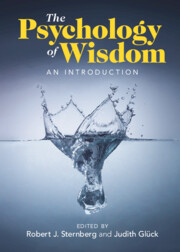Book contents
- The Psychology of Wisdom
- The Psychology of Wisdom
- Copyright page
- Contents
- Figures
- Tables
- Contributors
- Preface
- Part I Introduction to Wisdom Theory and Research
- Part II Foundations of Wisdom in the Individual and in the World
- Part III The Modifiability of Wisdom
- Part IV Wisdom in the World
- Chapter 13 Wisdom in the Professions
- Chapter 14 Wisdom and Leadership
- Chapter 15 Wisdom and Social Policy
- Index
- References
Chapter 15 - Wisdom and Social Policy
from Part IV - Wisdom in the World
Published online by Cambridge University Press: 26 May 2022
- The Psychology of Wisdom
- The Psychology of Wisdom
- Copyright page
- Contents
- Figures
- Tables
- Contributors
- Preface
- Part I Introduction to Wisdom Theory and Research
- Part II Foundations of Wisdom in the Individual and in the World
- Part III The Modifiability of Wisdom
- Part IV Wisdom in the World
- Chapter 13 Wisdom in the Professions
- Chapter 14 Wisdom and Leadership
- Chapter 15 Wisdom and Social Policy
- Index
- References
Summary
The complexity of 21st-century problems requires citizens and political and economic leaders to think more deeply and expansively so they can develop the wisdom necessary for humanity to survive and perhaps thrive in the decades to come. This chapter explores the nature of some 21st-century issues, including the causes of some of the most pressing, large-scale problems in today's world. It describes the ethical insight and higher-order thinking necessary for understanding and addressing these problems. It also provides brief overviews of some new creative and critical thinking strategies that can be applied to social policy issues. In essence, it makes the case for humanity to make a significant leap upward in ethical awareness.
Keywords
- Type
- Chapter
- Information
- The Psychology of WisdomAn Introduction, pp. 245 - 261Publisher: Cambridge University PressPrint publication year: 2022

